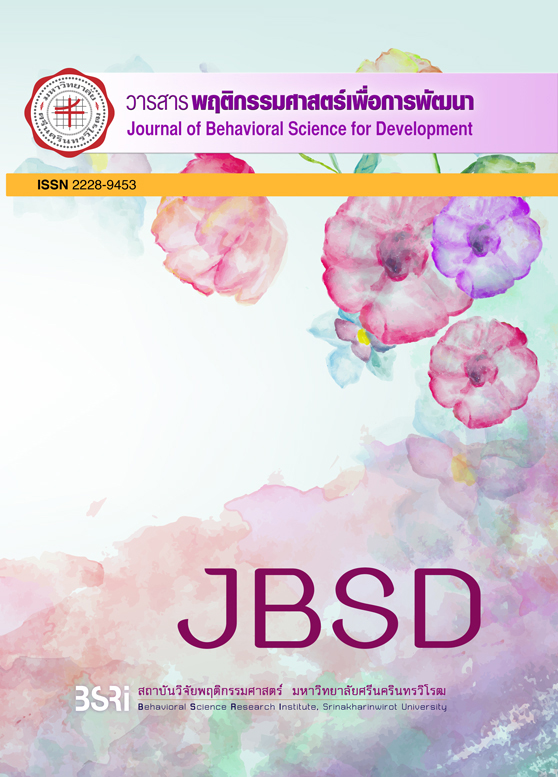Effects of Support Group Participation in Promoting Self-efficacy and Quality of Life of Rural Elders with Hyperlipidemia
บทคัดย่อ
ผลของการมีส่วนร่วมในกลุ่มมิตรสัมพันธ์ต่อการส่งเสริมความสามารถดูแลตนเองและคุณภาพชีวิตของผู้สูงอายุในชนบทที่เป็นโรคไขมันในเลือดสูง
Abstract
The purposes of this study were to investigate effects of support group participation on enhancing self-efficacy, quality of life, and blood cholesterol and triglyceride levels, as well as to explore perceptions about experiences of group participation among rural elders with hyperlipidemia. Participatory action research with an integration of both quantitative and qualitative approaches was designed for the study. Critical social theory was used as a guiding framework to emancipate the rural elders with hyperlipidemia from disadvantaged conditions for a better life. Twenty participants were purposively recruited from rural elders with hyperlipidemia living at a rural village to participate in the support group meetings offered twice a month for six months. Quantitative data assessing the participant’s self-efficacy, quality of life, and blood cholesterol and triglyceride levels were analyzed by paired-samples t test. Qualitative data from focus group discussion and observation were analyzed by content analysis. The results revealed that after 6-month of group participation, participants reported significantly increased self-efficacy and quality of life while their blood cholesterol and triglyceride levels significantly decreased (p < .01). In addition, they perceived benefits of group participation in enhancing their self-efficacy and quality of life. Culturally-sensitive knowledge and a sense of empowerment that individuals received from the group increased their self-control and power for better managing the disease. A sense of self-efficacy fostered them to conform to others for improved self-efficacy. The recommendation is that the support group as a form of mutual aid that could offer great benefits to rural elders with hyperlipidemia should be implemented in community care setting.
Keywords: elder, hyperlipidemia, quality of life, self-efficacy, support group
บทคัดย่อ
การศึกษานี้มีวัตถุประสงค์เพื่อศึกษาผลของการมีส่วนร่วมในกลุ่มมิตรสัมพันธ์ต่อการส่งเสริมความสามารถในการดูแลตนเอง คุณภาพชีวิตและระดับคลอเลสเตอรอลและไตรกลีเซอไรด์ ตลอดจนการรับรู้เกี่ยวกับประสบการณ์การเข้ากลุ่มมิตรสัมพันธ์ของผู้สูงอายุในชนบทที่เป็นโรคไขมันในเลือดสูง เป็นการวิจัยเชิงปฏิบัติการแบบมีส่วนร่วมที่มีการเก็บข้อมูลทั้งเชิงปริมาณและเชิงคุณภาพโดยใช้ทฤษฎีวิพากษ์สังคม (Critical social theory) เป็นกรอบแนวคิด ผู้ร่วมวิจัย 20 คนถูกคัดเลือกแบบเฉพาะเจาะจงจากผู้สูงอายุซึ่งอาศัยอยู่ที่หมู่บ้านชนบทแห่งหนึ่ง เพื่อเข้าร่วมประชุมกลุ่มเดือนละสองครั้งเป็นเวลา 6 เดือน วิเคราะห์ข้อมูลเชิงปริมาณจากแบบวัดความสามารถดูแลตนเอง แบบวัดคุณภาพชีวิต แบบวัดระดับคลอเลสเตอรอลและไตรกลีเซอไรด์ในเลือดด้วยสถิติวิเคราะห์ความแตกต่างแบบ paired-samples t test วิเคราะห์ข้อมูลเชิงคุณภาพจากการสนทนากลุ่มและการสังเกตด้วยการวิเคราะห์เนื้อหาแบบ content analysis หลังเข้ากลุ่มมิตรสัมพันธ์เป็นเวลา 6 เดือน ผู้ร่วมวิจัยมีคะแนนความสามารถดูแลตนเองและคุณภาพชีวิตเพิ่มขึ้น มีระดับคลอเลสเตอรอลและไตรกลีเซอไรด์ในเลือดลดลงอย่างมีนัยสำคัญทางสถิติ (p < .01) ผู้ร่วมวิจัยรับรู้ถึงประโยชน์จากการเข้ากลุ่มมิตรสัมพันธ์ว่าทำให้ความสามารถดูแลตนเองและคุณภาพชีวิตดีขึ้น ความรู้ที่สอดคล้องกับวัฒนธรรมท้องถิ่นและการรับรู้ว่าตนเองมีพลังอำนาจทำให้มีการควบคุมตนเองและรู้สึกว่าตนเองมีความสามารถที่จะบริหารจัดการกับโรคไขมันในเลือดสูงที่เป็นอยู่ การรับรู้ว่าตนเองมีความสามารถในการดูแลตนเองทำให้เกิดการปฏิบัติตามผู้อื่นเพื่อที่จะปรับปรุงการดูแลตนเองให้ดีขึ้น กลุ่มมิตรสัมพันธ์ในรูปแบบการช่วยเหลือซึ่งกันและกันจะเป็นประโยชน์อย่างยิ่งสำหรับผู้สูงอายุในชนบทที่เป็นโรคไขมันในเลือดสูง และสมควรนำไปปฏิบัติในการส่งเสริมสุขภาพผู้สูงอายุในชนบทกลุ่มอื่นต่อไป
คำสำคัญ: กลุ่มมิตรสัมพันธ์ ไขมันในเลือดสูง คุณภาพชีวิต ความสามารถดูแลตนเอง ผู้สูงอายุ



